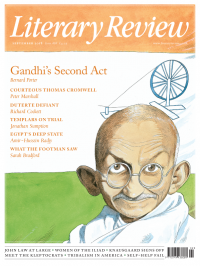Alan Ryan
Age of Anxiety
The Monarchy of Fear: A Philosopher Looks at Our Political Crisis
By Martha C Nussbaum
Oxford University Press 249pp £18.99
Nervous States: How Feeling Took Over the World
By William Davies
Jonathan Cape 252pp £16.99
Both of these books are directed to the strange political times in which we live. The Monarchy of Fear, indeed, is subtitled ‘A Philosopher Looks at Our Political Crisis’. They could hardly be more different, however. Martha Nussbaum’s book is highly personal in all sorts of ways: it begins with a substantial autobiographical preface in which she recounts her early life and its impact on her subsequent career as one of the world’s best-known and best-regarded moral philosophers; every chapter harks back to the work she has previously done on emotions in social and political life. Readers who have read Nussbaum’s Political Emotions in particular may feel that The Monarchy of Fear is somewhat repetitive, but new readers get what amounts to a vivid introduction to a lot of her recent work.
William Davies, on the other hand, dives straight into his topic: the capacity of feelings to overcome reason. His chosen example is the extraordinary occasion in November 2017 when panic-stricken passengers and passers-by at Oxford Circus station became convinced that a terrorist attack was taking place and that shots had been fired. It soon emerged that no shots had been fired and that there was no attack of any sort. Passengers on the platform had been disturbed by a scuffle between two men, and their movement away from the scuffle had disconcerted other passengers, having a sort of amplifier effect.
Davies is interested in what one might call the rise and fall of attempts to make society reasonable. After a brief but enlightening account of the life of Gustave Le Bon and his work on the irrationality of crowds, he turns back to the 17th century and rationalists

Sign Up to our newsletter
Receive free articles, highlights from the archive, news, details of prizes, and much more.@Lit_Review
Follow Literary Review on Twitter
Twitter Feed
Under its longest-serving editor, Graydon Carter, Vanity Fair was that rare thing – a New York society magazine that published serious journalism.
@PeterPeteryork looks at what Carter got right.
Peter York - Deluxe Editions
Peter York: Deluxe Editions - When the Going Was Good: An Editor’s Adventures During the Last Golden Age of Magazines by Graydon Carter
literaryreview.co.uk
Henry James returned to America in 1904 with three objectives: to see his brother William, to deliver a series of lectures on Balzac, and to gather material for a pair of books about modern America.
Peter Rose follows James out west.
Peter Rose - The Restless Analyst
Peter Rose: The Restless Analyst - Henry James Comes Home: Rediscovering America in the Gilded Age by Peter Brooks...
literaryreview.co.uk
Vladimir Putin served his apprenticeship in the KGB toward the end of the Cold War, a period during which Western societies were infiltrated by so-called 'illegals'.
Piers Brendon examines how the culture of Soviet spycraft shaped his thinking.
Piers Brendon - Tinker, Tailor, Sleeper, Troll
Piers Brendon: Tinker, Tailor, Sleeper, Troll - The Illegals: Russia’s Most Audacious Spies and the Plot to Infiltrate the West by Shaun Walker
literaryreview.co.uk